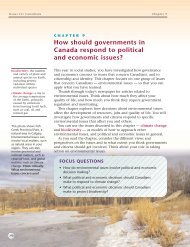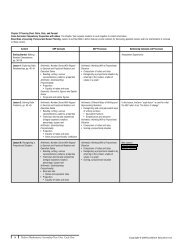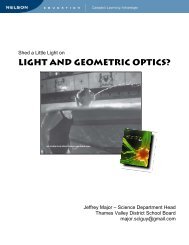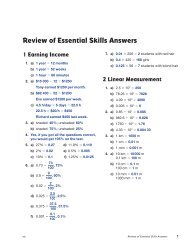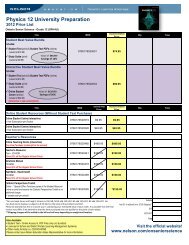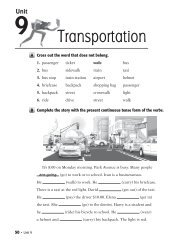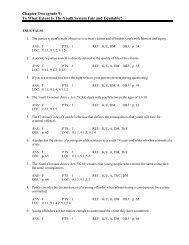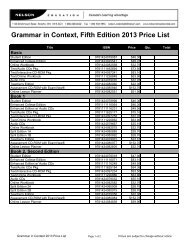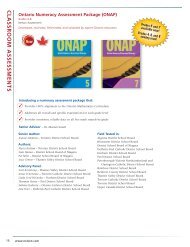PRE-PUBLICA TION EDITION - Nelson Education
PRE-PUBLICA TION EDITION - Nelson Education
PRE-PUBLICA TION EDITION - Nelson Education
Create successful ePaper yourself
Turn your PDF publications into a flip-book with our unique Google optimized e-Paper software.
Science, Technology,and SocietyYou do not have to look far to find evidence of theimpact of science and technology on society. Manyimportant discoveries and inventions have occurredwithin the last century—vaccines, antibiotics, organtransplants, reproductive technologies, geneticengineering, pesticides, atomic weapons, computers,lasers, plastics, televisions, communication satellites,and the Internet. The homes we live in, the food weeat, the vehicles we drive, and the electronic gadgetswe use are all products of scientific and technologicalachievement (Figure 6).(a)Figure 6 Examples of science and technology in our daily lives:(a) WiiFit (b) hybrid car engine.There are obvious influences of science andtechnology on society. But science and technologyare influenced by society as well. The values andpriorities of society at a particular time can influencethe direction and progress of developments in bothscience and technology. For example, our desire toreduce greenhouse gas emissions is encouraging therapid development of vehicles and machinery thatuse alternative fuels.Scientific and technological research is veryexpensive. Research facilities employ highly paid andhighly skilled professionals. The facilities consumelarge amounts of energy and require expensive andsophisticated tools and equipment. Funding forresearch comes from both private and public sources.It may be a long time between the beginning ofresearch and development and the release of a newproduct or process.Basic ResearchBasic research helps people learn more about howthe natural world works and is essentially the sameas scientific investigation. Basic research—in areassuch as biochemistry, particle physics, astronomy, andgeology—usually receives funding from governmentgrant agencies.(b)This type of research often produces knowledgethat engineers and technologists can use to developpractical solutions to everyday problems. Thepriorities of government, representing the prioritiesof the public, determine which areas of research arefunded.Applied ResearchApplied research is primarily focused ondeveloping new and better solutions to practicalproblems. Applied research can be equated withthe development of technology. Research into thedevelopment of technology—such as new cosmetics,sports equipment, telephones, automobiles, computersoftware and hardware, medical equipment, andpharmaceuticals—is usually carried out by privatelyowned companies. The marketplace, or the publicdemand for new products, will obviously influencewhich areas of research private companies fund. Ifmarket analysis shows that there is a demand forbetter cellphones or more fuel-efficient cars, researchand development in these areas will be supported.There are risks and benefits associated with manyscientific and technological developments. Althoughmost technologies are developed with the intentionof solving problems, there are often unintendedconsequences associated with their use. Socialnetworking sites, and other Internet technologies, cangreatly facilitate communication; however, the sametechnology is also used to commit crimes.It is difficult, if not impossible, to foresee allof the consequences of technologies. Often, newapplications of scientific and technological knowledgeare found long after the knowledge was first acquired.An important question remains up for debate. Whois responsible for the negative impacts of scienceand technology on society: scientists, science andtechnology, or human use of science and technology?Science, Technology, andthe EnvironmentSince the beginning of the Industrial Revolutionin the late 1700s, the industrialized world has usednatural resources at an increasing rate. With the useof resources, the development of technology, and thehuman population all increasing, we are producingwaste faster than ever.656 What Is Science? NEL



